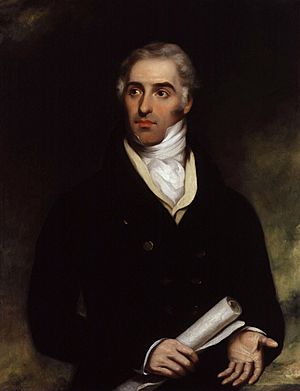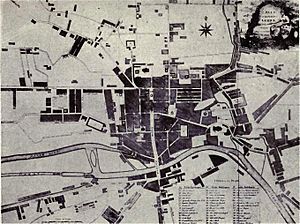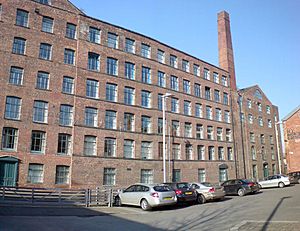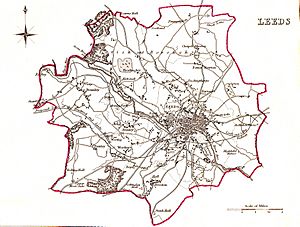Michael Thomas Sadler facts for kids
Quick facts for kids
Michael Thomas Sadler
|
|
|---|---|

Portrait by William Robinson, c. 1830
|
|
| Member of Parliament for Newark | |
| In office 1829–1831 |
|
| Member of Parliament for Aldborough | |
| In office 1831–1832 |
|
| Personal details | |
| Born | 3 January 1780 Snelston, Derbyshire, Great Britain |
| Died | 29 July 1835 (aged 55) Belfast, Ireland, UK |
| Resting place | Ballylesson |
| Political party | Tory/Ultra-Tory |
Michael Thomas Sadler (born January 3, 1780 – died July 29, 1835) was a British politician. He was a Member of Parliament (MP) for the Tory party. Sadler was a strong Christian who believed in helping those in need. His experiences working with the poor in Leeds made him disagree with ideas that said helping the poor was a bad thing. He believed everyone deserved support.
Contents
Michael Sadler's Political Career
Michael Sadler became a Member of Parliament in the British House of Commons. He was chosen by a powerful noble, the 4th Duke of Newcastle. Sadler first represented the area of Newark. He was known for being against giving more rights to Catholics.
Working for the Poor in Ireland
Sadler spent a lot of his time in Parliament trying to extend the Poor Law to Ireland. The Poor Law was a system in England that provided help for people who were very poor. Ireland did not have this system, and Sadler believed it was unfair. He argued that everyone deserved help when they were sick or could not find work.
Fighting for Child Workers: The Ten Hour Bill
In 1832, Sadler introduced a very important law proposal. It was called the "Ten Hour Bill." This bill aimed to set rules for children working in textile factories. It wanted to make sure children under 18 worked no more than ten hours a day. It also wanted to set a minimum age for child workers.
Sadler led a special committee to gather information for his bill. This committee heard many stories from child workers about long hours and bad treatment. The stories shocked the public. Even though his bill didn't become law right away, it made the government realize new laws were needed.
After a big change in how Parliament worked (called the Reform Act), Sadler tried to get elected in Leeds but lost. Another politician, Lord Ashley, took over the fight for factory reform. Sadler's work on the Ten Hour Bill is what he is most remembered for today.
Michael Sadler's Early Life
Michael Sadler was born in Snelston, Derbyshire, on January 3, 1780. His father, James Sadler, was a local landowner. Michael was taught at home.
In 1800, he moved to Leeds to work with his older brother, Benjamin. They were linen-drapers, selling fabrics. Later, they went into business importing Irish linen. Michael married Anne, the eldest daughter of his business partner, in 1816.
Sadler was a member of the local government in Leeds. He wrote articles for the local newspaper that supported the Tory party. He also led a group of local volunteers during the Napoleonic Wars.
He spent a lot of time helping sick and poor people through a group called the 'Stranger's Friend Society'. He also ran a large Sunday School. Most importantly, he served on the board that managed help for the poor in Leeds. These experiences showed him the struggles of poor people. This made him care deeply about their well-being for the rest of his life.
Sadler also became a founder of the Leeds Literary and Philosophical Society. He gave talks there about the Poor Laws. He strongly disagreed with famous thinkers like Thomas Malthus. Malthus believed that if you helped the poor too much, the population would grow too fast. Sadler thought this idea was wrong and harmful. He believed that happiness and kindness should guide how society helps its people.
In 1828, he wrote a book called Ireland; its Evils and their Remedies. In it, he argued that Ireland needed Poor Laws. He also said that Ireland's problems were not because of too many people. He pointed out that the most successful part of Ireland, Ulster, was also the most crowded.
Becoming a Member of Parliament
Before 1832, the town of Newark elected two MPs. The powerful Duke of Newcastle had a lot of control over who was chosen. He would even evict tenants who didn't vote for his chosen candidates.
In 1829, one of Newark's MPs resigned because he disagreed with the government's plan to give more rights to Catholics. The Duke of Newcastle chose Michael Sadler to replace him. Sadler was known for his strong opposition to Catholic rights. He believed that giving Catholics more power would harm the country.
Sadler won the election in Newark. However, the Duke's control was weakening. In 1831, it was decided that Sadler should run for Aldborough instead. Aldborough was a very small area with few voters, and the Duke of Newcastle had complete control there. So, in 1831, Sadler was elected without anyone running against him.
Sadler's Time in Parliament
Debating Catholic Rights
Sadler's first big speech in Parliament was against the bill that would give more rights to Catholics. People liked his speech, but it was clear he wouldn't get a government job because he wasn't considered "socially polished." Later, one opponent even called his speaking style "canting."
Pushing for Irish Poor Laws
Sadler continued to argue in Parliament that England's Poor Law system should be extended to Ireland. He gave a long speech in 1830, saying it was a matter of "justice, policy and mercy." He believed that if people owned land, there should be a way to help those who couldn't work or were sick.
In 1831, he proposed that Poor Laws should be introduced in Ireland. His idea was narrowly defeated, but it was seen as a moral victory. This meant it was very likely the government would have to act. The Poor Law system was finally brought to Ireland in 1838, after Sadler had passed away.
Views on Population and Poverty
Sadler strongly disagreed with the ideas of Thomas Malthus about population. Malthus believed that human population grows faster than food production. He thought that poverty and suffering were natural ways to control population. Malthus even suggested that if society helped the poor too much, it would just lead to more poor people.
Sadler studied population numbers carefully. He found that in more crowded areas, birth rates were actually lower. He argued that a better standard of living, not poverty, was the best way to control population growth. He believed that prosperity made people have fewer children.
In 1830, Sadler published a huge book called The Law of Population. It had over 1,300 pages and many statistics. A famous writer named Thomas Babington Macaulay wrote a very harsh review of Sadler's book. Macaulay said Sadler's book was "very bad" and full of "vague, bombastic declamation." Sadler wrote a response, showing that Macaulay had misrepresented his work. Despite the criticism, Sadler was elected a Fellow of the Royal Society in 1832.
Supporting His Patron
The Duke of Newcastle, who helped Sadler get into Parliament, had special leases on Crown lands. It was rumored that these leases helped him control voters. In Parliament, Sadler spoke up to defend the Duke. He praised his patron, though not always accurately.
Parliamentary Reform in 1831
After the Catholic Relief Bill passed, the government changed. The new government wanted to reform Parliament. This meant getting rid of "rotten boroughs" (areas with very few voters but still electing MPs) and creating new ones for big towns like Leeds.
Sadler was against these reforms. He argued that they would take away traditional voting rights in some areas. He also spoke about the need to help agricultural workers by building good cottages for them.
In September 1831, Sadler agreed to run as the Tory candidate for the new Leeds seat in the next election. However, the reform bill was rejected by the Lords. Sadler then announced he would introduce a bill to regulate child labor in factories.
The Ten Hour Bill in 1832
In 1832, Parliament was busy with the third Reform Bill. Sadler focused his efforts on his Ten Hour Bill. This bill aimed to expand existing factory laws to all textile industries. It wanted to limit the workday for children under 18 to ten hours. It also kept the ban on night work for those under 21 and said no child under nine should be employed.
Earlier laws had only applied to cotton mills. Sadler wanted his law to cover all textile factories. Groups called 'Short Time Committees' had formed to push for a ten-hour workday for children. Many factory workers hoped this would also limit adult working hours.
Sadler's bill was finally debated in March 1832. Many MPs supported the idea of factory laws but wanted more evidence. Sadler reluctantly agreed to send his bill to a special committee. He was made chairman of this committee. This allowed him to present evidence from witnesses who supported his views. This step meant the bill would not become law before Parliament was dissolved.
Sadler's committee gathered many shocking stories about child labor. He tried to pass the bill without waiting for the committee's full report, but other MPs objected. The committee's findings were published in August 1832. Sadler announced he would bring the bill back in the next session.
The Leeds Election of 1832
In the 1832 election, Sadler ran for the new seat in Leeds. His opponents were Thomas Babington Macaulay, a well-known Whig politician, and John Marshall. Marshall's family owned large flax-spinning mills in Leeds.
The election campaign started with a lively public meeting. Sadler was supported by the local Short-Time Committee. All candidates shared their views on factory laws. Sadler was for the ten-hour bill. Marshall thought a 69-hour week was okay for children in well-run mills. Macaulay supported regulation but wanted more evidence.
During the campaign, there were arguments about Sadler's past. Some said he had changed his religious views for personal gain. His opponents also accused him of using the factory reform issue just to get votes. Macaulay called Sadler a "convenient philanthropist."
When the votes were counted, Sadler lost. Marshall received 2012 votes, Macaulay 1984, and Sadler came in third with 1596 votes.
Sadler's Final Years
The Fate of the Ten Hour Bill
In early 1833, parts of Sadler's committee report were published in newspapers. They showed a terrible picture of child labor in factories, with long hours and cruel treatment. Many newspapers called for Sadler's bill to be passed.
Lord Ashley took over Sadler's role as the main supporter of factory reform in Parliament. He reintroduced the Ten Hour Bill. However, some MPs criticized Sadler's report, saying it was one-sided because only his chosen witnesses had been heard.
A new Factory Commission was set up to investigate factory conditions more thoroughly. Sadler and his supporters tried to stop this commission, wanting the bill to pass immediately. Lord Ashley's bill was debated, but the government decided to pass a Factory Act based on the commission's recommendations instead.
Huddersfield By-election 1834
In 1834, there was an unexpected election in Huddersfield. Sadler was asked to run as a Tory candidate with support from some Radical groups. However, there were accusations against Sadler and his allies about money and broken promises related to the Ten-Hour campaign.
Because of these issues and policy differences, the Radical groups in Huddersfield decided not to support Sadler. He came in second place in the election, losing to the Whig candidate.
This was the last election Sadler ran in. In July 1834, he moved with his family to Belfast, Ireland. He died there in 1835 and was buried in Ballylesson churchyard. There is a statue of Michael Sadler in Leeds, which was put up by public donations to honor his work.
Michael Sadler's Major Works
- Ireland, Its Evils and their Remedies (published 1828)
- The Law of Population: A Treatise, in Six Books (published 1830)
- Report of the Select Committee on his Factory Regulation Bill, 1832
Minor Works
- A refutation of an article in the Edinburgh Review (1830: a response to a review of his Law of Population book)
- The Factory Girl's Last Day (a poem)
|
 | Roy Wilkins |
 | John Lewis |
 | Linda Carol Brown |




